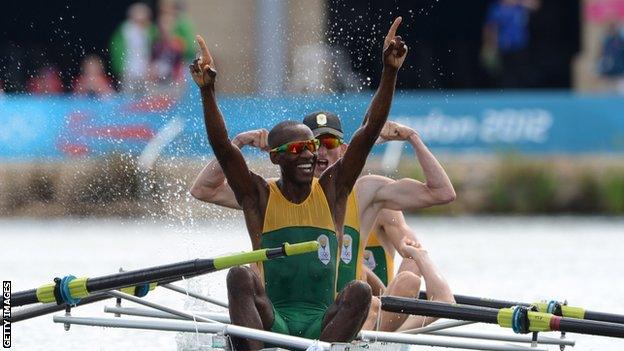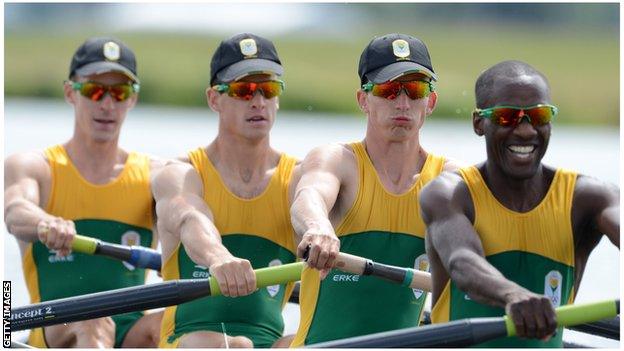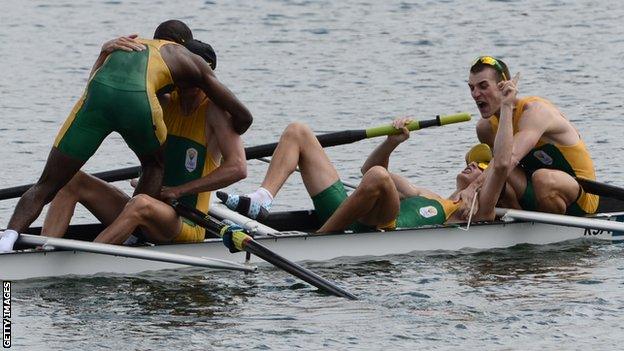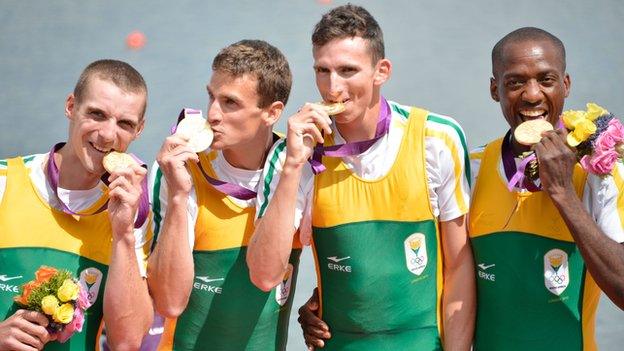Africa Olympic stories: Sizwe Ndlovu overcomes racism and poverty to win gold in 2012
- Published

Sizwe Ndlovu and his teammates won South Africa's first ever Olympic rowing gold at the 2012 Games in London
Sizwe Ndlovu’s road to Olympic gold was a tough one and eight years later he still does not quite believe he made it.
“It still gives me a bit of goose bumps,” he told BBC Sport Africa.
“I get excited and pinch myself, in the sport of rowing it was the first time a black person won a gold medal for Africa never mind South Africa.”
On 2 August, 2012 at Eton Dorney just outside London in England, Ndlovu alongside his compatriots, James Thompson, Matthew Brittain and John Smith won rowing gold in the men’s lightweight coxless fours.
It was South Africa’s first ever gold medal in rowing at the Olympics making Ndlovu the first black African man to win gold in the sport.
He had achieved what only one other black South African had been able to at the Olympics, Josia Thugwane, the man who inspired Ndlovu’s Olympic dream.
Thugwane was South Africa’s first black athlete to win Olympic gold as he won the marathon at the 1996 Games.
“I was watching the Atlanta Olympics and, Josia Thugwane, who won the first gold medal in athletics for us in long distance and from then I was inspired," he explained.
"When you watch on TV you see the light, the circus, it is just the atmosphere but you could feel from watching how exciting it is, and I said to myself I want to go to Olympics."
Ndlovu's turn at the Olympics was everything he had imagined, the lights just as glitzy, atmosphere as electric and to top it all he brought home a gold medal becoming a national inspiration like Thugwane before him.
Proving the racists wrong

South Africa's 2012 fours team in action during London Olympics
Throughout his career however, Ndlovu’s dark skin was part of the challenges he faced in what is white-dominated sport in South Africa and from a young age he was made to feel that he was different.
The prejudice was something that he had to deal with all the way through the junior ranks.
“I remember no white person wanted to row with a black person in the boat," he explained.
"When the coach would say, 'Sizwe you are rowing with this person' and you look at this person’s face, I mean you can see they don’t want to row with you.
"Whatever goes wrong in that boat, whether in training or competition we come last, it was blamed on the black person, me, that was the challenge.
“I think they felt I was incompetent, that black is nothing, they don’t how to row, he is only learning.
"So it was tough, you had to prove yourself all the time. And you were always put at the back of the boat where you are following the others."
As he progressed to the senior ranks the incidents reduced as he not only proved his ability but also found his own way to cope with the racism.
“It was hurting at times but in my head, I would say I need to prove myself, I need to beat this person,” he told BBC Sport Africa
A year before the gold medal winning Olympics achievement, an incident with a teammate at training left him ready to quit the sport for good.
Ndlovu had been tasked with steering the boat and setting the rhythm for the session but one of his team-mates was not happy with this and did not follow the lead.
"I got off the water, got into the car and went home. I said I was done with this," he remembered.
"I was upset with one person, his job was to follow me but I think for him it was I am following a black man I am better than him and stronger than him.
“Yes, he was stronger than me at the time, when I look back but I was faster than him, I had a better feel of the boat."
Thanks to an understanding coaching team, that had worked to forge a culture shift in the team, Ndlovu’s teammate apologised, they made up and won gold together at the Olympics the next year.
Racism not the only challenge

Sizwe Ndlovu and his team-mates celebrated as they crossed the line to win Olympic rowing gold in 2012
Racism was not the only challenge that Ndlovu had to deal with as he grew up.
Born in 1980 as the last born in a family of seven. His mother was a domestic worker and father worked as a taxi driver.
At the age of six he was sent to live with his maternal grandparents before moving in with his paternal grandparents.
“Money was tight, food was tight, there were nights we went to bed without food," he remembered.
"Three to four days before the end of the month, you are waiting for your mother to get paid and our grandparents to get their pension.
"In a household where there is eight people (cousins as well), we didn’t have electricity, we used coal, we’d even use cow dung (to burn for cooking and warmth) that we’d have to go find and get in a field."
It was a life that did not offer many opportunities at the time and Ndlovu recollects that growing up his ambition was to be a teacher, a policeman or a nurse, because to be a doctor one had to be white.
“It was tough and it built me, I think that was one of the things that encouraged me not to look back," he insisted.
Things began to change for Ndlovu in 1995 when he moved back to live in Johannesburg with his parents and with apartheid over, he was able to attend a high school for whites, but his financial situation did not improve.
“My mother was earning 800 rand (a month) and half of which had to go back home to her parents and the school fees at my school was 1500 rand (per term) so that tells you I had to look for work at around 14 years, so I used to deliver newspapers in Johannesburg from around 2am in the morning before school,” he told BBC Sport Africa.
It was in high school that Ndlovu was introduced to rowing by his headmaster, the late Tom Price and with this he was able to get a scholarship to university where he continued to hone his skill while studying sports management.
After university rowing was not paying the bills and he took up different jobs including being a police reservist at some point and some of his friends chided him for hanging on to the sport.
"After varsity I had friends discouraging me, asking 'why are you doing this stupid white sport, it doesn’t pay bills' they’d tell me, but I loved it, it has changed my life," he remembered.
He was to suffer even more setbacks in his bid to realise his Olympic dream as South Africa failed to qualify for the 2004 and 2008 Olympics in rowing
Ndlovu shoulders the blame for the 2008 failure. He lost his mother days before the qualifying regatta, he then buried her on a Sunday, flew out to the competition on the Wednesday and competed a day after that.
“I should’ve stayed at home,” he tells BBC Sport Africa.
“There was the pressure from my teammates because we had been six and the team of four had been selected.
"I wanted to stay but they spoke to me and said 'bury your mother and fly later', so there was a lot happening in my head.
"They blamed me for missing qualification and I did too, I was not in a state to race."
A new approach

South Africa's 2012 rowing team agreed they would not cry on the podium as they received their gold medals
At this point in his life Ndlovu took a break from the sport but in 2009 a new coach, Roger Barrow, asked him to return to the team.
For this Olympic cycle things were going to be different with the team set-up at a high-performance centre in Pretoria, living like true professionals.
“I felt like it was another chance, third time trying for the Olympics but things were different, I am not going to be running around like a headless chicken." he recalled.
"I wasn’t going to worry about what am I going to eat. That was a dream to me it was a new lifestyle."
The lifestyle paid off and in 2012, two months before the Olympics, the team won a silver medal at the World Cup, which boosted their confidence going into London and they qualified easily for the final.
In the final, the team were second last 500m into the race and the doubts started creeping in.
"At the time I was like, patience, but at the same time I had doubts and demons in my head that we are not going to win the race," Ndlovu admitted.
Their strategy was to have a measured race and halfway through it started bearing fruit.
“At that point your lungs are burning, your legs are burning, but knowing our game plan is to build it up slowly not to rush, not to panic, it kept me confident," he continued.
"With 1,000m to go we started building and I could feel now we are moving and the doubts started disappearing and the rest was history."
It was a tight win, edging out Great Britain by 0.25 seconds to claim the gold and as emotive as that moment was, the crew had promised themselves one thing, no tears.
“We said no one must cry. I think we were too happy but I think tears happened later privately but not in front of media," Ndlovu recalled."
“One thing I was wishing was that my late mother was there and my former headmaster had seen all of it, but it almost felt like she was in that race pushing me.
"There are no words to describe the feeling when you stand on that podium and hear your national anthem."
Helping the next generation
It was Ndlovu’s only Olympic appearance and a cherished one at that. Today he has turned his passion into teaching the next generation as a rowing coach and manager at the University of Johannesburg.
Almost three decades since he joined the sport one thing continues to haunt him, the lack of diversity in rowing in South Africa.
"At national level I am not happy, if you look at our national team now it is purely white, when I retired there was no other black person," he lamented.
"There was a chance of a black person but they were being discouraged, because if you don’t come from a rich family it doesn’t pay the bills, so if you are not rich or cannot afford your kid to row for me it is discrimination.
“Yes, I know they say they are happy using the school but there hasn’t been a path or process where we are helping the young ones from school to varsity, varsity to national squad, there isn’t a structure yet.
"So far it has been 'oh, there’s a rower he might be like Sizwe let’s get him in' and then they put the young rower under pressure for a couple of months and he’s like this is not for me so we are losing these young kids. More needs to be done”
Ndlovu, who goes into different parts of the country trying to get kids into the sport, hopes that the change which is overdue does not take much longer to come.